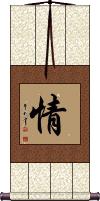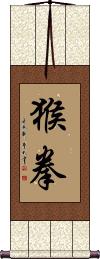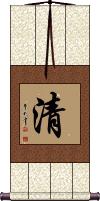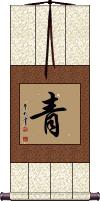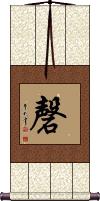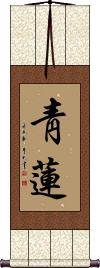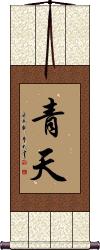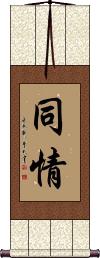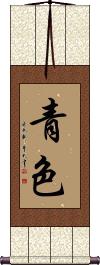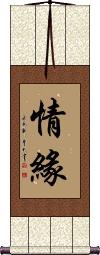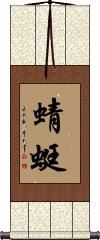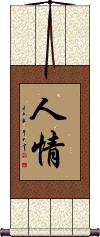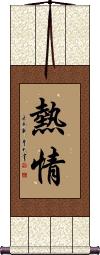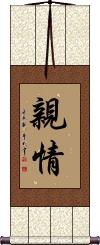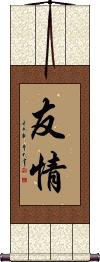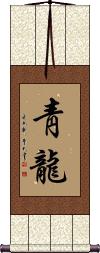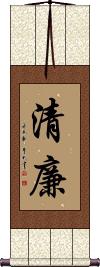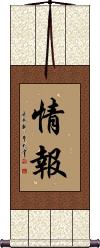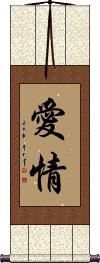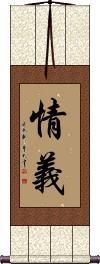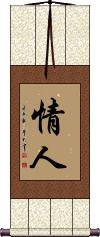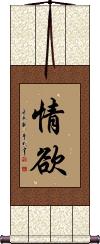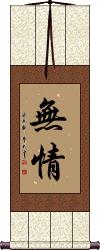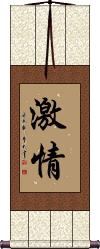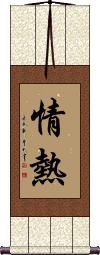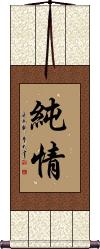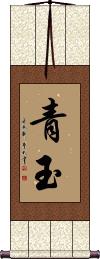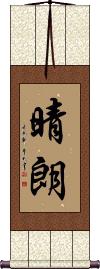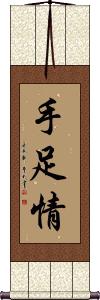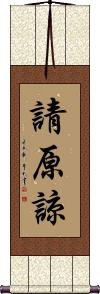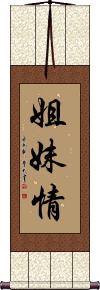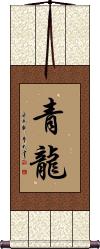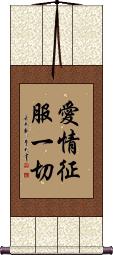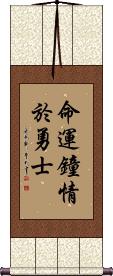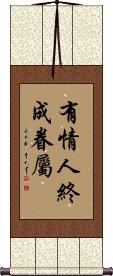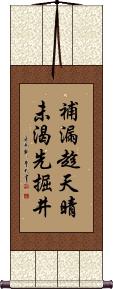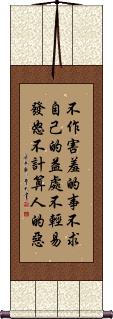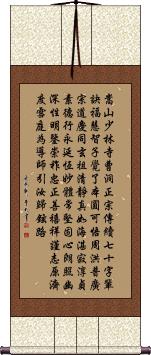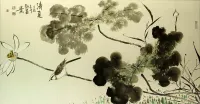Many custom options...
And formats...

Qing in Chinese / Japanese...
Buy a Qing calligraphy wall scroll here!
Personalize your custom “Qing” project by clicking the button next to your favorite “Qing” title below...
1. Passions / Feelings / Emotions
3. Monkey Fist
4. Clarity
5. Green
6. Khánh
7. Blue Lotus
9. Compassion
10. Cyan
11. Predestined Love / Love by Fate
12. Dragonfly
14. Enthusiasm
15. Family Love
16. Friendship
17. Green Dragon / Blue Dragon
19. Intelligence / Information-Gathering
21. Love and Honor
24. No Mercy
25. Romantic Passion
27. Enthusiasm / Passion for a Cause
28. Pure Heart
29. Sapphire
31. Brotherly and Sisterly Love
32. Chung Do Kwan
34. Seijimon
35. Sisterhood
36. Blue Dragon / Azure Dragon
37. Fire and Water Have No Mercy
38. Forever Young
39. Green Fire
40. Green Plum and Bamboo Horse
41. Life of Love
42. Love and Honor
45. CIA
47. You are always a beauty in your lover’s eyes
50. Fix the roof before the rain; Dig the well before you are thirsty
Passions / Feelings / Emotions
情 means feelings, emotions, passions, and sometimes refers to the situation you are in (with your emotions).
At least, this is the definition in Chinese and Japanese. This word is a bit stronger in Korean Hanja, where it means affection, love, compassion, sympathy, tender feelings, and emotions. Just as in Chinese and Japanese, this can also refer to your circumstances or your facts of life in Korean.
情 is also the original Korean Hanja for the surname Jeong (정).
In Japanese, this can be the surname Sei.
Forgive and Forget
略跡原情 is a Chinese proverb that means “to overlook past faults,” or “forgive and forget.”
It's more literally, “Abridge or make small the scars from your past emotions.” You should let it go.
The character breakdown:
略 (lüè) abbreviation; omission; abridge.
跡 (jī) ruins; scar; traces.
原 (yuán) former.
情 (qíng) feeling; emotion.
Monkey Fist
猴拳 literally means what you think, it's the “Monkey Fist” school of Kung Fu. A style that mimics the punches and movements of monkeys and apes.
Becoming popular during the Qing Dynasty, this style can trace its origins back to as early as the Song Dynasty. Some of the romance and popularity of this style comes from the novel “Journey to the West” which features the Monkey King and his fighting skills.
This novel and martial arts style has spawned a stream of Hong Kong movies featuring the Monkey King and other Kung Fu style variations such as “Drunken Monkey” and “Monkey Stealing Peaches” (a technique of disabling your opponent by grabbing and yanking on his testicles).
Note: This kind of makes sense in Korean Hanja and Japanese Kanji but probably unknown by all Koreans and Japanese except those who have an interest in this form of Kung Fu.
Clarity
清 is a word that means clarity or clear in Chinese, Japanese Kanji, and old Korean Hanja.
Looking at the parts of this character, you have three splashes of water on the left, “life” on the top right, and the moon on the lower right.
Because of something Confucius said about 2500 years ago, you can imagine that this character means “live life with clarity like bright moonlight piercing pure water.” The Confucian idea is something like “Keep clear what is pure in yourself, and let your pure nature show through.” Kind of like saying, “Don't pollute your mind or body, so that they remain clear.”
This might be stretching the definition of this single Chinese character but the elements are there, and “clarity” is a powerful idea.
Korean note: Korean pronunciation is given above but this character is written with a slight difference in the "moon radical" in Korean. However, anyone who can read Korean Hanja, will understand this character with no problem (this is considered an alternate form in Korean). If you want the more standard Korean Hanja form (which is an alternate form in Chinese), just let me know.
Japanese note: When reading in Japanese, this Kanji has additional meanings of pure, purify, or cleanse (sometimes to remove demons or "exorcise"). Used more in compound words in Japanese than as a stand-alone Kanji.
Green
The fresh green of nature
青 is nature's color and can refer to forest green, greenish-blue, or the darkest of greens.
青 and color represent nature, youth, and young people.
In the same way, we refer to green bananas and the rookie being green, the same is true in Chinese and Japanese, where, in a certain context, this can mean immature, unripe, or young.
In Japan, this can also be a female given name “Haru.” It can also be used as a given name (for either sex) in China.
Khánh
磬 means “chime stones,” but I'm including it here for those looking for the original Chinese character for the Vietnamese name Khánh.
Other definitions include ancient percussion instrument made of stone or jade pieces hung in a row and struck as a xylophone, sounding stone, ancient Chinese chime shaped like a chevron.
There is also a possibility that your original character is 慶 which means to celebrate or felicity. Contact me if you need that character.
Blue Lotus
靑蓮 is a common title for Blue Lotus.
靑蓮 is often used in a Buddhist context for blue lotus from the Sanskrit “utpala.” This often refers to the clarity and purity of the lotus blue eyes possessed by a Living Buddha. It can also represent the purity of mind (without desire, suffering, fear, etc.).
Clear Blue Sky
Compassion
These two characters mean compassion and sympathy in Chinese, Japanese, and Korean, which makes this word universal.
Compassion is caring and understanding someone is hurt or troubled (even if you don't know them). It is wanting to help, even if all you can do is listen and say kind words. You forgive mistakes. You are a friend when someone needs a friend.
Cyan
Predestined Love / Love by Fate
Dragonfly
Empathy / Humanity
人情 is a title that can apply to a lot of meanings, including humanity, empathy, kindness, sympathy, human nature, human emotions, or human interaction.
Enthusiasm
熱情 is a Chinese and Korean word for enthusiasm that can also be translated as passion (for a cause), ardency, ardor/ardour, enthusiasm, or zeal.
Enthusiasm is being warm, cheerful, happy, and full of spirit. It is doing something wholeheartedly and eagerly. When you are enthusiastic, you have a positive attitude.
In some contexts, this could mean being extremely fond of something or having a fondness for a cause or person.
This Chinese word can also be translated as "sincere and warm" or literally "warm sentiment / affection."
See Also: Motivation | Passion | Commitment | Tenacity
Family Love
Friendship
友情 can be translated as “camaraderie” or “fellowship.”
But this character combination is only used commonly in Japanese Kanji and Korean Hanja.
Green Dragon / Blue Dragon
靑龍 is a title that can mean blue or green dragon.
The first character can mean blue, green, azure, or celadon.
The second character means dragon.
This is mostly a Chinese title (especially in Buddhism). It will be understood but less commonly used in Japanese and Korean.
Integrity / Honesty
Intelligence / Information-Gathering
If you are a government spy, engaged in business espionage, or in some military intelligence department, 情報 is both the title of what you are doing and what you are collecting about your enemy.
It is suggestive by itself of military intelligence but applies to corporate intelligence if you are keeping an eye on your competition in business.
Love and Affection
愛情 is a universal word in Japanese, Korean, and Chinese which means love and affection.
Some may translate this as “love between a man and a woman.”
Depending on the context, it can mean utter devotion or favorite.
Love and Honor
情義 means to love and honor in Chinese. 情義 is more or less the kind of thing you'd find in marriage vows.
The first character suggests emotions, passion, heart, humanity, sympathy, and feelings.
In this context, the second character means to honor your lover's wishes and treat them justly and righteously (fairly). That second character can also be translated as “obligation,” as in the obligation a husband and wife have to love each other even through difficult times.
In the context outside of a couple's relationship, this word can mean “comradeship.”
Japanese may see this more as “humanity and justice” than “love and honor.” It's probably best if your target is Chinese.
This is the short and sweet form, there is also a longer poetic form (you can find it here: Love and Honor if it’s not on the page you are currently viewing).
See Also: Love and Honor
Lover / Sweetheart
情人 means lover, sweetheart, or beloved in Chinese and Japanese Kanji.
This term is gender-neutral so anyone can use it.
Please note that this term can easily be read or used to mean “mistress” or the kind of lover you have an affair with (especially in Japanese). The context in which this word is used affects the actual meaning. Husbands and wives or boyfriends and girlfriends can also use this term for each other with no ill meaning.
Lust / Desire / Passion
情欲 can be defined as lust, sexual desire, sensual desire, carnal desire, carnal passions, sexual desire, and passion.
The first character means feeling, emotions, passionate, sympathy, affection, love, compassion, tender feelings, and sometimes circumstances or facts.
The second character means desire, longing, appetite, wish, covetousness, greed, passion, desire, and craving.
This word is universal in Chinese, Japanese Kanji, and Korean Hanja.
No Mercy
無情 is a terrible phrase for a calligraphy wall scroll. I'm not even sure any of my calligraphers will write this. It's just that many people have searched my website for “no mercy.”
This word means pitiless, ruthless, merciless, heartless, heartlessness, hardness, cruelty, or ruthless.
In the context of Buddhism, this is used to describe something or someone that is non-sentient (inhuman or without feeling).
Romantic Passion
Beyond romantic passion, 激情 also means “strong emotion” or “fervor.”
The meaning in Japanese is a little more radical, as beyond "passion" it can be understood as "violent emotion" or "fury."
Passion for a Cause
Depending on the context, 熱情 can mean “cordial,” “enthusiastic,” “passionate,” or “passionately.”
This version is sometimes used in Japanese, but the character order is more common in Chinese and Korean Hanja. The meaning in Japanese for this Kanji order is ardor/ardour or zeal but rarely used in modern Japan. I suggest you choose a different version of “passion” if your audience is Japanese.
See Also: Persistence | Devotion | Tenacity | Commitment | Motivation
Enthusiasm / Passion for a Cause
情熱 is the Japanese word that means enthusiasm or “passion for a cause.”
In some contexts, this could mean being extremely fond of something or having a fondness for a cause or person.
Can also be translated as passion, zeal, ardor/ardour, or fervor.
Note: This word (or character order) is not natural in Chinese. However, a typical Chinese person can guess this is a Japanese or Korean word and understand the intended meaning. This selection is best if your audience is Japanese or old-school Korean.
See Also: Persistence | Devotion | Tenacity | Commitment | Motivation
Pure Heart
Pure and Innocent
純情 means “Pure Heart” in Chinese, Japanese Kanji, and old Korean Hanja.
It's used to reflect the ideas of being “pure and innocent.”
Depending on the context in which this title is used, it can relay “self-sacrificing devotion” or, in some cases, “naïveté.”
This would be in the same way we might refer to a young girl giving her lunch money to a beggar on the street. She has a pure and precious heart but perhaps is also a bit naive.
Sapphire
Sunny / Clear and Bright
Brotherly and Sisterly Love
手足情 is the love between siblings.
When you love, protect, care for, and have a deep bond that only brothers or sisters can.
The actual translation is “Hand and Foot,” but the relationship between brothers or sisters is like that of hands and feet. They belong together and complete the body. Even though this says “hand and foot,” it will always be read with the brotherly and sisterly love meaning in Chinese.
Note: During the past 20 years, the “One child policy” in China is slowly making this term obsolete.
Chung Do Kwan
靑濤館 is the Korean martial arts style, Chung Do Kwan, meaning “Blue Wave School.”
If you want this in modern Korean Hangul characters, click on the Hangul next to the Korean flag above instead of the button above.
Also Romanized as “Cheong Do Gwan” or “Ch'ŏng Do Kwan.”
Please Forgive Me
Seijimon
Sisterhood
Blue Dragon / Azure Dragon
青龍 is a scholarly title for “Blue Dragon” or “Azure Dragon.”
You'll find this title used in ancient Chinese literature and astronomy. This dragon has dominion over the eastern sky or eastern heavens. The Azure Dragon is also noted for representing the spring season. Also seen as an auspicious omen.
Emperor Huizong of the Song Dynasty canonized the five colored dragons as “kings.” The Azure Dragon represents the most compassionate of kings.
In Japanese, this title is known with the same meaning but can also be a given name, Seiryuu or Seiryu.
Note, the first character can be written as ![]() OR
OR ![]() . Same character, just two ways to write it.
. Same character, just two ways to write it.
Fire and Water Have No Mercy
Forever Young
Green Fire
Green Plum and Bamboo Horse
Innocent Children's Games
青梅竹馬 means “green plums and hobby-horse.”
Figuratively, it means “innocent children's games,” “childhood sweethearts,” or “a couple who grew up as childhood friends.”
This phrase may sound a little strange as it's a kind of Chinese proverb or idiom. It makes much more sense in Chinese than in English.
Life of Love
愛情生活 is the Chinese proverb for “Loving Life.” Some also translate this as “[your] Loving Life” or “Life full of Love.”
This is about being a loving person (to your spouse and/or family) during your life. This is not the same as loving the state of being alive - not “love of living” but rather “being a loving person during your life.”
Note: Korean pronunciation is included above, though use of this proverb in Korean has not been verified.
This proverb can be understood in Japanese but
it’s
primarily a Chinese proverb (it will "feel" Chinese to a Japanese person).
Love and Honor
深情厚義 means to love and honor.
This is more or less the kind of thing you'd find in marriage vows.
The first two characters suggest deep love or deep emotions, passion, and feelings.
The last two characters mean generous justice or thick honor (the third character is an adjective that means generous or thick). It just means that you will honor your lover's wishes and treat them justly and righteously (fairly).
This is the longer four-character version, there is also a short and sweet two character version.
See Also: Love and Honor
Pledge of Lifelong Love
情定終身 is a pledge of eternal love in Chinese.
This can also be a colloquial way to refer to the act of exchanging marriage vows.
If you and your mate want to express how committed you are to your life-long love, this will be a great piece of calligraphy for your wall. Also, a nice phrase to celebrate an anniversary.
Military Intelligence
軍事情報 is the full way to say “Military Intelligence.”
The first two characters mean “military affairs.”
The second two characters mean “intelligence” or “information-gathering.”
If you work in the G2 section of your military unit, this is the wall scroll for you.
See Also: Military
Love Conquers All
You are always a beauty in your lover’s eyes
Any woman with affection for Asian art will love a gift of this Chinese proverb calligraphy on a wall scroll.
She will melt in your arms as you tell her the meaning of these characters.
Contained in this phrase is a reference to the most beautiful woman in Chinese history. Her name was Xi Shi, and she was known to have good looks that need not have fine robes or makeup. Her charms were so powerful that she brought down an entire kingdom (in a successful effort to bring honor and pride back to her people).
情人眼里出西施 is a great way to express that the woman in your life is your one love.
Fortune Favors The Brave
Love Will Find A Way
Fix the roof before the rain; Dig the well before you are thirsty
补漏趁天晴未渴先掘井 is a Chinese proverb that literally translates as: Mend the roof while the weather is fine, [and when you are] not yet thirsty, dig the well beforehand.
In simple terms, this means: Always being prepared in advance.
See Also: Have a Walking Stick at the Ready Before You Stumble
1 Corinthians 13:5
Here is 1 Corinthians 13:5 in Chinese.
The text with punctuation:
不作害羞的事。不求自己的益处。不轻易发怒。不计算人的恶。
Hand-painted calligraphy does not retain punctuation.
This translation is from the Chinese Union Bible.
You may know it from the KJV as:
Doth not behave itself unseemly, seeketh not her own, is not easily provoked, thinketh no evil.
Shaolin Generational Poem
This is a poem, including a title, that celebrates the tactics and virtues of the Shaolin Kung Fu Monks for future generations.
This in-stock artwork might be what you are looking for, and ships right away...
Gallery Price: $67.00
Your Price: $36.88
Gallery Price: $67.00
Your Price: $36.88
Gallery Price: $67.00
Your Price: $36.88
Gallery Price: $67.00
Your Price: $36.88
Gallery Price: $67.00
Your Price: $36.88
Not the results for qing that you were looking for?
Below are some entries from our dictionary that may match your qing search...
| Characters If shown, 2nd row is Simp. Chinese |
Pronunciation Romanization |
Simple Dictionary Definition |
情 see styles |
qíng qing2 ch`ing ching makoto まこと |
More info & calligraphy: Passions / Feelings / Emotions(1) feelings; emotion; sentiment; (2) compassion; sympathy; (3) passion; affection; love; (4) the way things really are; the actual situation; (personal name) Makoto The feelings, passions, desires, affections, sensations; sentient; affinities; affairs, facts. Particular affections, duties, or affairs. |
清 see styles |
qīng qing1 ch`ing ching seiji / seji せいじ |
More info & calligraphy: Clarity(hist) Qing dynasty (of China; 1644-1912); Ch'ing dynasty; Manchu dynasty; (personal name) Seiji |
磬 see styles |
qìng qing4 ch`ing ching kei / ke けい |
More info & calligraphy: Khánhsounding stone; qing; ancient Chinese chime shaped like a chevron (inverted 'v'), orig. of stone, today often metal, in Japan primarily used at Buddhist temples; (given name) Kei A piece of flat stone or metal, used as a gong, or for musical percussion. |
親 亲 see styles |
qìng qing4 ch`ing ching yoshimi よしみ |
More info & calligraphy: Kean(1) (ant: 疎・そ・2) intimacy; closeness; friendliness; (2) close relative; (prefix) (3) (See 親米) pro- (e.g. pro-American); (personal name) Yoshimi Personally related, own, intimate; family; a wife, marriage. |
青 see styles |
qīng qing1 ch`ing ching haru はる |
More info & calligraphy: Green(n,adj-no,adj-na) (1) blue; (2) green; (3) (abbreviation) green light; (4) black (horse coat color); (prefix) (5) immature; unripe; young; (female given name) Haru |
人情 see styles |
rén qíng ren2 qing2 jen ch`ing jen ching ninjou / ninjo にんじょう |
More info & calligraphy: Empathy / Humanity(1) humanity; empathy; kindness; sympathy; (2) human nature; common sense; customs and manners human emotions |
友情 see styles |
yǒu qíng you3 qing2 yu ch`ing yu ching firia ふぃりあ |
More info & calligraphy: Friendshipfriendship; fellowship; camaraderie; (female given name) Firia |
同情 see styles |
tóng qíng tong2 qing2 t`ung ch`ing tung ching doujou / dojo どうじょう |
More info & calligraphy: Compassion(n,vs,vi) sympathy; compassion; pity |
情人 see styles |
qíng rén qing2 ren2 ch`ing jen ching jen joujin; jounin / jojin; jonin じょうじん; じょうにん |
More info & calligraphy: Lover / Sweetheartlover; sweetheart; mistress |
情報 情报 see styles |
qíng bào qing2 bao4 ch`ing pao ching pao jouhou / joho じょうほう |
More info & calligraphy: Intelligence / Information-Gathering(1) information; news; report; intelligence; (2) information (data contained in characters, signals, code, etc.) |
情欲 see styles |
qíng yù qing2 yu4 ch`ing yü ching yü jōyoku じょうよく |
More info & calligraphy: Lust / Desire / PassionThe passions, desires. |
情緣 情缘 see styles |
qíng yuán qing2 yuan2 ch`ing yüan ching yüan |
More info & calligraphy: Predestined Love / Love by Fate |
情義 情义 see styles |
qíng yì qing2 yi4 ch`ing i ching i jougi / jogi じょうぎ |
More info & calligraphy: Love and Honorjustice and humanity |
愛情 爱情 see styles |
ài qíng ai4 qing2 ai ch`ing ai ching aijou / aijo あいじょう |
More info & calligraphy: Love and Affection(noun - becomes adjective with の) love; affection |
晴朗 see styles |
qíng lǎng qing2 lang3 ch`ing lang ching lang harou / haro はろう |
More info & calligraphy: Sunny / Clear and Bright(noun or adjectival noun) clear; fair; fine; serene; (male given name) Harou |
清廉 see styles |
qīng lián qing1 lian2 ch`ing lien ching lien kiyoyuki きよゆき |
More info & calligraphy: Integrity / Honesty(noun or adjectival noun) honest; upright; cleanhanded; unselfish; (given name) Kiyoyuki |
激情 see styles |
jī qíng ji1 qing2 chi ch`ing chi ching gekijou / gekijo げきじょう |
More info & calligraphy: Romantic Passionviolent emotion; passion; fury |
無情 无情 see styles |
wú qíng wu2 qing2 wu ch`ing wu ching mujou / mujo むじょう |
More info & calligraphy: No Mercy(n,adj-na,adj-no) (1) (ant: 有情・2) heartlessness; hardness of heart; coldheartedness; cruelty; (adj-no,n) (2) {Buddh} insentient; inanimate non-sentient |
熱情 热情 see styles |
rè qíng re4 qing2 je ch`ing je ching netsujou / netsujo ねつじょう |
More info & calligraphy: Passion for a Causeardour; ardor; passion; fervour; fervor |
純情 纯情 see styles |
chún qíng chun2 qing2 ch`un ch`ing chun ching junjou / junjo じゅんじょう |
More info & calligraphy: Pure Heart(noun or adjectival noun) pure heart; naivete; innocence |
蜻蛉 see styles |
qīng líng qing1 ling2 ch`ing ling ching ling kagerou / kagero かげろう |
More info & calligraphy: Dragonfly(kana only) dragonfly; damselfly; (female given name) Kagerou |
蜻蜓 see styles |
qīng tíng qing1 ting2 ch`ing t`ing ching ting |
More info & calligraphy: Dragonfly |
親情 亲情 see styles |
qīn qíng qin1 qing2 ch`in ch`ing chin ching |
More info & calligraphy: Family Love |
靑蓮 靑莲 see styles |
qīng lián qing1 lian2 ch`ing lien ching lien |
More info & calligraphy: Blue Lotus |
靑龍 靑龙 see styles |
qīng lóng qing1 long2 ch`ing lung ching lung |
More info & calligraphy: Green Dragon / Blue Dragon |
青天 see styles |
qīng tiān qing1 tian1 ch`ing t`ien ching tien harutaka はるたか |
More info & calligraphy: Clear Blue Skyblue sky; (personal name) Harutaka |
青色 see styles |
qīng sè qing1 se4 ch`ing se ching se aoiro(p); seishoku / aoiro(p); seshoku あおいろ(P); せいしょく |
More info & calligraphy: Cyan(noun - becomes adjective with の) blue |
傾 倾 see styles |
qīng qing1 ch`ing ching kyō なのめ |
to overturn; to collapse; to lean; to tend; to incline; to pour out (out-dated kanji) (out-dated or obsolete kana usage) (adj-no,adj-na,n) (1) slanting; tilted; sloping; diagonal; oblique; (2) unusual; slanted (view of the world); bad (mood); (out-dated kanji) (adj-no,adj-na,n) (1) slanting; tilted; sloping; diagonal; oblique; (2) unusual; slanted (view of the world); bad (mood) to lean |
凊 see styles |
qìng qing4 ch`ing ching |
(literary) cold; cool; chilly |
勍 see styles |
qíng qing2 ch`ing ching tsuyoshi つよし |
violent; strong (male given name) Tsuyoshi |
Click here for more qing results from our dictionary
The following table may be helpful for those studying Chinese or Japanese...
| Title | Characters | Romaji (Romanized Japanese) | Various forms of Romanized Chinese | |
| Passions Feelings Emotions | 情 | jou / nasake jo / nasake | qíng / qing2 / qing | ch`ing / ching |
| Forgive and Forget | 略跡原情 略迹原情 | lüè jì yuán qíng lve4 ji4 yuan2 qing2 lve ji yuan qing lvejiyuanqing | chi yüan ch`ing chiyüanching chi yüan ching |
|
| Monkey Fist | 猴拳 | hóu quán / hou2 quan2 / hou quan / houquan | hou ch`üan / houchüan / hou chüan | |
| Clarity | 清 | sei | qīng / qing1 / qing | ch`ing / ching |
| Green | 青 | ao | qīng / qing1 / qing | ch`ing / ching |
| Khánh | 磬 | kei / ke | qìng / qing4 / qing | ch`ing / ching |
| Blue Lotus | 靑蓮 靑莲 | seiren | qing lián / qing lian2 / qing lian / qinglian | ch`ing lien / chinglien / ching lien |
| Clear Blue Sky | 青天 | seiten | qīng tiān qing1 tian1 qing tian qingtian | ch`ing t`ien chingtien ching tien |
| Compassion | 同情 | dou jou / doujou / do jo | tóng qíng tong2 qing2 tong qing tongqing | t`ung ch`ing tungching tung ching |
| Cyan | 青色 | aoiro | qīng sè / qing1 se4 / qing se / qingse | ch`ing se / chingse / ching se |
| Predestined Love Love by Fate | 情緣 情缘 | qíng yuán qing2 yuan2 qing yuan qingyuan | ch`ing yüan chingyüan ching yüan |
|
| Dragonfly | 蜻蜓 | qīng tíng qing1 ting2 qing ting qingting | ch`ing t`ing chingting ching ting |
|
| Empathy Humanity | 人情 | ninjou / ninjo | rén qíng / ren2 qing2 / ren qing / renqing | jen ch`ing / jenching / jen ching |
| Enthusiasm | 熱情 热情 | rè qíng / re4 qing2 / re qing / reqing | je ch`ing / jeching / je ching | |
| Family Love | 親情 亲情 | qīn qíng / qin1 qing2 / qin qing / qinqing | ch`in ch`ing / chinching / chin ching | |
| Friendship | 友情 | yuujou / yujo | yǒu qíng / you3 qing2 / you qing / youqing | yu ch`ing / yuching / yu ching |
| Green Dragon Blue Dragon | 靑龍 靑龙 | sei ryū / seiryū | qīng lóng qing1 long2 qing long qinglong | ch`ing lung chinglung ching lung |
| Integrity Honesty | 清廉 | sei ren / seiren | qīng lián qing1 lian2 qing lian qinglian | ch`ing lien chinglien ching lien |
| Intelligence Information-Gathering | 情報 情报 | jouhou / joho | qíng bào / qing2 bao4 / qing bao / qingbao | ch`ing pao / chingpao / ching pao |
| Love and Affection | 愛情 爱情 | aijou / aijo | ài qíng / ai4 qing2 / ai qing / aiqing | ai ch`ing / aiching / ai ching |
| Love and Honor | 情義 情义 | qíng yì / qing2 yi4 / qing yi / qingyi | ch`ing i / chingi / ching i | |
| Lover Sweetheart | 情人 | jou nin / jou jin jounin / joujin jo nin / jo jin | qíng rén / qing2 ren2 / qing ren / qingren | ch`ing jen / chingjen / ching jen |
| Lust Desire Passion | 情欲 | jouyoku / joyoku | qíng yù / qing2 yu4 / qing yu / qingyu | ch`ing yü / chingyü / ching yü |
| No Mercy | 無情 无情 | mujou / mujo | wú qíng / wu2 qing2 / wu qing / wuqing | wu ch`ing / wuching / wu ching |
| Romantic Passion | 激情 | gekijou / gekijo | jī qíng / ji1 qing2 / ji qing / jiqing | chi ch`ing / chiching / chi ching |
| Passion for a Cause | 熱情 热情 | netsujou / netsujo | rè qíng / re4 qing2 / re qing / reqing | je ch`ing / jeching / je ching |
| Enthusiasm Passion for a Cause | 情熱 情热 | jou netsu / jounetsu / jo netsu | qíng rè / qing2 re4 / qing re / qingre | ch`ing je / chingje / ching je |
| Pure Heart | 純情 纯情 | jun jou / junjou / jun jo | chún qíng chun2 qing2 chun qing chunqing | ch`un ch`ing chunching chun ching |
| Sapphire | 青玉 | seigyoku | qīng yù / qing1 yu4 / qing yu / qingyu | ch`ing yü / chingyü / ching yü |
| Sunny Clear and Bright | 晴朗 | seirou / sero seiro / sero | qíng lǎng qing2 lang3 qing lang qinglang | ch`ing lang chinglang ching lang |
| Brotherly and Sisterly Love | 手足情 | shǒu zú qíng shou3 zu2 qing2 shou zu qing shouzuqing | shou tsu ch`ing shoutsuching shou tsu ching |
|
| Chung Do Kwan | 靑濤館 | qīng tāo quǎn qing1 tao1 quan3 qing tao quan qingtaoquan | ch`ing t`ao ch`üan chingtaochüan ching tao chüan |
|
| Please Forgive Me | 請原諒 请原谅 | qíng yuán liàng qing2 yuan2 liang4 qing yuan liang qingyuanliang | ch`ing yüan liang chingyüanliang ching yüan liang |
|
| Seijimon | 清島門 清岛门 | qīng dǎo mén qing1 dao3 men2 qing dao men qingdaomen | ch`ing tao men chingtaomen ching tao men |
|
| Sisterhood | 姐妹情 | jiě mèi qíng jie3 mei4 qing2 jie mei qing jiemeiqing | chieh mei ch`ing chiehmeiching chieh mei ching |
|
| Blue Dragon Azure Dragon | 青龍 / 靑龍 青龙 | sei ryuu / seiryuu / sei ryu | qīng lóng qing1 long2 qing long qinglong | ch`ing lung chinglung ching lung |
| Fire and Water Have No Mercy | 水火無情 水火无情 | shuǐ huǒ wú qíng shui3 huo3 wu2 qing2 shui huo wu qing shuihuowuqing | shui huo wu ch`ing shuihuowuching shui huo wu ching |
|
| Forever Young | 永遠年輕 永远年轻 | yǒng yuǎn nián qīng yong3 yuan3 nian2 qing1 yong yuan nian qing yongyuannianqing | yung yüan nien ch`ing yungyüannienching yung yüan nien ching |
|
| Green Fire | 爐火純青 炉火纯青 | lú huǒ chún qīng lu2 huo3 chun2 qing1 lu huo chun qing luhuochunqing | lu huo ch`un ch`ing luhuochunching lu huo chun ching |
|
| Green Plum and Bamboo Horse | 青梅竹馬 青梅竹马 | qīng méi zhú mǎ qing1 mei2 zhu2 ma3 qing mei zhu ma qingmeizhuma | ch`ing mei chu ma chingmeichuma ching mei chu ma |
|
| Life of Love | 愛情生活 爱情生活 | aijyou seikatsu aijyouseikatsu aijyo seikatsu | ài qíng shēng huó ai4 qing2 sheng1 huo2 ai qing sheng huo aiqingshenghuo | ai ch`ing sheng huo aichingshenghuo ai ching sheng huo |
| Love and Honor | 深情厚義 深情厚义 | shēn qíng hòu yì shen1 qing2 hou4 yi4 shen qing hou yi shenqinghouyi | shen ch`ing hou i shenchinghoui shen ching hou i |
|
| Pledge of Lifelong Love | 情定終身 情定终身 | qíng dìng zhōng shēn qing2 ding4 zhong1 shen1 qing ding zhong shen qingdingzhongshen | ch`ing ting chung shen chingtingchungshen ching ting chung shen |
|
| Military Intelligence | 軍事情報 军事情报 | gunji-jouhou gunji-joho | jūn shì qíng bào jun1 shi4 qing2 bao4 jun shi qing bao junshiqingbao | chün shih ch`ing pao chünshihchingpao chün shih ching pao |
| CIA | 中央情報局 中央情报局 | chuuoujouhoukyoku / chuojohokyoku chuojohokyoku / chuojohokyoku | zhōng yāng qíng bào jú zhong1 yang1 qing2 bao4 ju2 zhong yang qing bao ju zhongyangqingbaoju | chung yang ch`ing pao chü chungyangchingpaochü chung yang ching pao chü |
| Love Conquers All | 愛情征服一切 爱情征服一切 | ài qíng zhēng fú yī qiè ai4 qing2 zheng1 fu2 yi1 qie4 ai qing zheng fu yi qie aiqingzhengfuyiqie | ai ch`ing cheng fu i ch`ieh aichingchengfuichieh ai ching cheng fu i chieh |
|
| You are always a beauty in your lover’s eyes | 情人眼里出西施 | qíng rén yǎn lǐ chū xī shī qing2 ren2 yan3 li3 chu1 xi1 shi1 qing ren yan li chu xi shi qingrenyanlichuxishi | ch`ing jen yen li ch`u hsi shih chingjenyenlichuhsishih ching jen yen li chu hsi shih |
|
| Fortune Favors The Brave | 命運鐘情於勇士 命运钟情于勇士 | mìng yùn zhōng qíng yú yǒng shì ming4 yun4 zhong1 qing2 yu2 yong3 shi4 ming yun zhong qing yu yong shi | ming yün chung ch`ing yü yung shih ming yün chung ching yü yung shih |
|
| Love Will Find A Way | 有情人終成眷屬 有情人终成眷属 | yǒu qíng rén zhōng chéng juàn shǔ you3 qing2 ren2 zhong1 cheng2 juan4 shu3 you qing ren zhong cheng juan shu | yu ch`ing jen chung ch`eng chüan shu yu ching jen chung cheng chüan shu |
|
| Fix the roof before the rain; Dig the well before you are thirsty | 補漏趁天晴未渴先掘井 补漏趁天晴未渴先掘井 | bǔ lòu chèn tiān qíng wèi kě xiān jué jǐng bu3 lou4 chen4 tian1 qing2 wei4 ke3 xian1 jue2 jing3 bu lou chen tian qing wei ke xian jue jing | pu lou ch`en t`ien ch`ing wei k`o hsien chüeh ching pu lou chen tien ching wei ko hsien chüeh ching |
|
| 1 Corinthians 13:5 | 不作害羞的事不求自己的益處不輕易發怒不計算人的惡 不作害羞的事不求自己的益处不轻易发怒不计算人的恶 | bù zuò hài xiū de shì bù qiú zì jǐ de yì chu bù qīng yì fā nù bù jì suàn rén de è bu4 zuo4 hai4 xiu1 de shi4 bu4 qiu2 zi4 ji3 de yi4 chu bu4 qing1 yi4 fa1 nu4 bu4 ji4 suan4 ren2 de e4 bu zuo hai xiu de shi bu qiu zi ji de yi chu bu qing yi fa nu bu ji suan ren de e | pu tso hai hsiu te shih pu ch`iu tzu chi te i ch`u pu ch`ing i fa nu pu chi suan jen te o pu tso hai hsiu te shih pu chiu tzu chi te i chu pu ching i fa nu pu chi suan jen te o |
|
| Shaolin Generational Poem | 嵩山少林寺曹洞正宗傳續七十字輩訣福慧智子覺了本圓可悟周洪普廣宗道慶同玄祖清靜真如海湛寂淳貞素德行永延恆妙體常堅固心朗照幽深性明鑒崇祚忠正善禧祥謹志原濟度雪庭為導師引汝歸鉉路 嵩山少林寺曹洞正宗传续七十字辈诀福慧智子觉了本圆可悟周洪普广宗道庆同玄祖清静真如海湛寂淳贞素德行永延恒妙体常坚固心朗照幽深性明鉴崇祚忠正善禧祥谨志原济度雪庭为导师引汝归铉路 | sōng shān shào lín sì cáo dòng zhèng zōng chuán xù qī shí zì bèi jué fú huì zhì zǐ jiào le běn yuán kě wù zhōu hóng pǔ guǎng zōng dào qìng tóng xuán zǔ qīng jìng zhēn rú hǎi zhàn jì chún zhēn sù dé xíng yong song1 shan1 shao4 lin2 si4 cao2 dong4 zheng4 zong1 chuan2 xu4 qi1 shi2 zi4 bei4 jue2 fu2 hui4 zhi4 zi3 jiao4 le5 ben3 yuan2 ke3 wu4 zhou1 hong2 pu3 guang3 zong1 dao4 qing4 tong2 xuan2 zu3 qing1 jing4 zhen1 ru2 hai3 zhan4 ji4 chun2 zhen1 su4 de2 xing2 yong song shan shao lin si cao dong zheng zong chuan xu qi shi zi bei jue fu hui zhi zi jiao le ben yuan ke wu zhou hong pu guang zong dao qing tong xuan zu qing jing zhen ru hai zhan ji chun zhen su de xing yong | sung shan shao lin ssu ts`ao tung cheng tsung ch`uan hsü ch`i shih tzu pei chüeh fu hui chih tzu chiao le pen yüan k`o wu chou hung p`u kuang tsung tao ch`ing t`ung hsüan tsu ch`ing ching chen ju hai chan chi ch`un chen su te hsing yung sung shan shao lin ssu tsao tung cheng tsung chuan hsü chi shih tzu pei chüeh fu hui chih tzu chiao le pen yüan ko wu chou hung pu kuang tsung tao ching tung hsüan tsu ching ching chen ju hai chan chi chun chen su te hsing yung |
|
| In some entries above you will see that characters have different versions above and below a line. In these cases, the characters above the line are Traditional Chinese, while the ones below are Simplified Chinese. | ||||
Successful Chinese Character and Japanese Kanji calligraphy searches within the last few hours...
